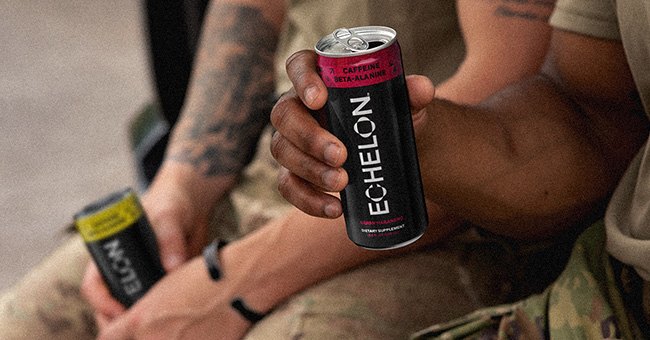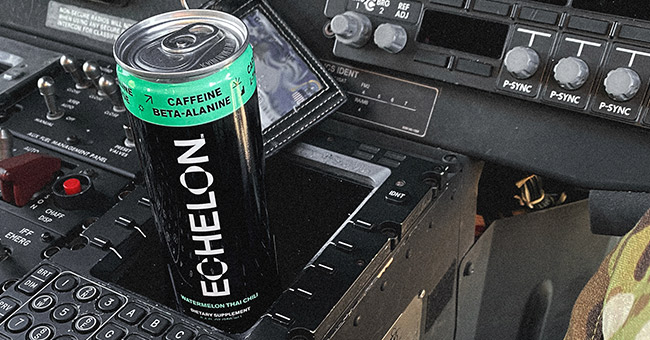
Since stepping away from day-to-day operations at the company in 2016, Harmless Harvest founder Justin Guilbert has spread his time across several new ventures, including sustainable seafood brand GoodFish and software startup Intraloop. Yet having tasted success in creating products, for his next challenge — high-caffeine energy drink line Echelon, launching nationwide exclusively at GNC next week — he found motivation in creating something slightly more, in his words, “spiritual.”
“The question was how can we create a mass consumer culture brand thats complete impetus and total mission is to demonstrate how to federate,” said Guilbert in a phone call last week. “How people of different walks of life, different lifestyles, different interests, different ideas, can and have to live together, work together and respect each other. And how together, they’re probably going to deliver more than separately.”
That’s a tall order for Echelon, which is positioned to compete directly with Bang, C4 and the range of other high-caffeine energy drinks that have emerged from the supplement space over the last several years. The brand packs its muscular, 300mg caffeine formula into an 8.4 oz. slim can in three flavors, each with a spicy kick: Yuzu Cayenne, Berry Habanero and Watermelon Thai. Unlike some of its aforementioned competitors, Echelon does include sugar (7 grams per serving) and also 200 mg of L-theanine to balance the caffeine and create a more efficacious feeling of mental focus, according to the company.
For Guilbert, the cause runs deep: his grandfather, a veteran, ran Eurpac Service, a military outlet product distributor, for years. Rather than an insular or narrow community, he sees the armed services as a “very progressive social construct,” in which individuals do not allow personal differences to compromise their shared goals.
“The minute you put your uniform on, you are just about as good as the person next to you,” he said. “And that’s a great thing, because suddenly you’ve got to rely on that person next to you — whether you like that person or not, whether she may be a gay female, or that, in another world, you’d never meet this person, and you might have an opinion on their ideas.”
Testing the Battalion
Together with business partners Benjamin Bernet and Charles Kim, operating as holding company underscore, Guilbert approached the U.S. Department of Defense with a proposition: if granted access to on-base retail stores, known as AAFES Exchange, the group could develop better products than those currently available to service members. It should be noted that from Ruckpack to Leatherneck to Grenade, energy drinks have thrived on-base since the category first entered the U.S., with a variety of nods toward military themes.
“We’re not going to appropriate the military ethos and identity, because that’s bullshit, that’s fake,” Guilbert said. “We’re going to go see those folks and we’re going to say we want to develop a bunch of consumer goods and products that are going to be designed, iterated, manufactured, and productized with your active duty service members. We’re going to sit down with a bunch of active duty service members and say what do you want? What do you need? What do you like? What don’t you like? How can we improve your life?”
The first brand born from that approach, personal care and wellness line BRAVO SIERRA, has already proven an early success. Initially launching exclusively in U.S. military Exchange stores and online in 2020, the company has since put up impressive sales numbers ($6 million in sales in its first year) while migrating its product range to chain retailers including Target and GNC last year. Arguably more important, it confirmed that the company’s system of engaging a targeted community for rapid-turnaround consumer product testing and ideation, dubbed Battalion, could work as a potentially powerful tool for their own use and for clients, including the U.S. government and one unnamed CPG company.

With Echelon, the company is seeking to alter some hard-wired habits around energy drinks for soldiers in the field; for many on active duty, Guilbert said, “the ‘Breakfast of Champions’ is a Monster White and packing a lip.” To start building his better-for-you alternative, Guilbert turned to an online cohort of around 3,000 active duty service members on bases across the globe, sending each a sample case of six cans. Over the course of 18 months, the company developed and refined over 20 prototypes of the three flavors using feedback from the group, with California-based Flavor Insights, run by Cytosport (Muscle Milk) founders the Pickett family handling back-end formulation and R&D.
Outside of the can itself, Echelon has also landed a formal partnership with The Green Beret Foundation, a charitable organization that provides support to U.S. Special Forces soldiers and their families. The group will receive a portion of all proceeds.
The result is a product fine tuned to the specific needs of elite soldiers; marketing materials tout benefits like “enhanced vascular potential” (via nitric oxide synthases L-Citrulline and L-Arginine), “energy metabolism support” (from capsaicin, Vitamin B6 and Vitamin B12) and “strength endurance” from beta-alanine, a short-term, high-intensity muscular stimulant that causes a tingling sensation in the fingertips. Their grueling daily routines, Guilbert noted, often have them alternating between high-intensity physical demands and detail-oriented desk work, with little time for breaks. That meant soldiers were asking for something smaller than a 16 oz. drink (thus the 8.4 oz. can), but still powerful enough to fuel them for long periods (thus the inclusion of fiber and isomaltulose to regulate absorption). The final product was “this kind of bizarre combination of a pre-workout and a traditional energy drink,” Guilbert said.
Expanding the Audience
Considering its development process, it’s maybe not surprising to hear that Echelon was well-received by the military community when the company began offering limited product “drops” to BRAVO SIERRA consumers via Battalion last year, in addition to launching on base Exchange stores. But its early adoption by adjacent communities — think gamers and Tough Mudder/Spartan Race challenge fans — teases its potential to fit Guilbert’s mission of creating a broadly impactful mass consumer brand. After helping Zoa get off to a fast start last year, GNC is set to get behind Echelon with both PDQ and cold case merchandising. Distribution will go through Europa.
Of course, this is where it can get tricky. Though the institution retains widespread public support, the adoption of military iconography and themes into consumer product marketing has generated divisive responses, as interpretations of patriotism can be subjective: see veteran-owned coffee roaster Black Rifle, which has faced scrutiny after its branding was associated with several violent acts last year, including the January 6 Capital Riots. Less controversially, several other energy drinks players, including Kill Cliff and Monster, have already made veterans and the military community a key focus for both their commercial outreach and charitable support.
But even as he wades into the fray with an unapologetically pro-military brand, Guilbert sees in Echelon a chance to turn certain tired tropes on their head.
“My company is not 100% veterans; it’s a ton of civilians, a ton of veterans, a ton of liberals, conservatives, boozers, vegan sobers,” he said. “So when I look at the different audiences adopting the brand, I don’t have an issue with that. What I do want to make sure of is that it’s not appropriated, and what I mean by that is, you suddenly will have fringe or marginal radical comedians that can say, ‘This is our brand, this is how it works for us.’
“I was very nervous about that with the military. We knew there would be a social media community that would suddenly get really into our thing, and then decide that it’s their brand. And it’s not. It’s everybody’s brand. So the way we counter that is that all of our ambassadors, all of the people that engage the brand publicly represent different subsets. We’re not doing one size fits all.”